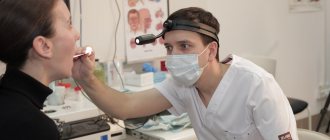A dry cough can be a symptom of many pathological conditions in the body, ranging from a mild cold to very serious diseases. If it occurs, you need to consult a doctor for a diagnosis.
Author:
- Galkin Alexey Vladimirovich
ENT pathology expert
3.33 (Votes: 15)
Coughing is a natural protective reflex of the body, a contraction of the chest muscles in response to the action of any irritant. Normally, it helps cleanse the mucous membranes of the respiratory tract from dust, mucus, and harmful microorganisms.
There are two types of cough: wet (productive) and dry (non-productive). In the first case, sputum is discharged, and the cough ultimately brings relief to the person. In the second, the cough is prolonged and painful, without sputum production, and is perceived by the person as much more painful. Most often, the disease begins with a dry cough, after which it transforms into a wet one, but sometimes this does not happen. A dry cough can be a symptom of many pathological conditions in the body - from a mild cold to serious illnesses. When it appears, even without signs of a cold or any other manifestations, you need to consult a doctor for a diagnosis. This will guarantee quick relief from dry cough, identification of the underlying disease or indication for lifestyle correction.
What is a dry cough?
Depending on its specifics, it can be:
- Long lasting. Usually it doesn't take at least a few minutes.
- Paroxysmal. Accompanied by difficulty breathing, severe wheezing, and a feeling of tightness in the chest.
- "Barking." So named due to its resemblance to the sounds made by animals.
- Suffocating. Accompanied by the inability to breathe air, usually for a few seconds. This is the most dangerous condition that requires urgent help.
- At night. Makes you wake up and doesn't go away for several minutes. Attacks of suffocation may occur.
This classification is needed so that you can describe your symptoms to the doctor in detail. It is important to talk about the time of occurrence of attacks, their duration, pain or absence thereof, impact on adjacent parts of the body, and other details.
Why does my cough get worse at night?
When a person is in a horizontal position, mucus accumulates in the nasopharynx and the airways are not cleared. When you have a runny nose, discharge from the nose and paranasal sinuses flows into the throat and causes a cough reflex, so the cough is painful during sleep, especially when we roll over from side to side, and in the morning when we get out of bed.
Dust and dry air can worsen a cough. This is especially true in apartments with central heating. Dry and hot air irritates the mucous membranes and provokes coughing attacks. To alleviate your condition, regularly ventilate the bedroom and do wet cleaning. It would be a good idea to buy an air humidifier. But if you don’t have one, and you need to fight a cough right now, you can hang a damp towel on the radiator or place a container of water next to the bed.
What diseases can cause cough?
A dry cough can be a consequence of:
- Inflammation of the larynx. At the same time, the sound is “barking”, the voice becomes hoarse, and the attacks themselves more often occur at night.
- Inflammation of the trachea and bronchi. A dry cough lasts 2-3 days, after which it turns into a wet cough and sputum begins to be released.
- Tuberculosis. A cough with tuberculosis does not end for several weeks in a row, despite taking any medications. The cough characteristic of this disease is frequent, dry and hacking, intensifying over time, accompanied by wheezing and sputum, and may be accompanied by hemoptysis.
- Pneumonia. At first it is “barking” and dry; from the 2-3rd day of the disease, sputum begins to be released, sometimes mixed with blood.
- Bronchial asthma. The cough is painful, with attacks of suffocation. The condition is dangerous, as with any attack of suffocation.
- Malignant tumors in the respiratory system. In oncology, the cough may be mild, depending on the type of tumor and its size. Shortness of breath is typical, chest pain and coughing up blood are possible. Any cancer is accompanied by weight loss and weakness.
- Whooping cough. The cough is severe and paroxysmal, often ending in vomiting. It is not blocked by any dry cough medications and can last for several months.
- Corey. Associated symptoms are fever and skin rash.
- Entry of foreign bodies into the respiratory tract. In this case, emergency medical care is important, as the condition can cause suffocation.
- Allergies. An allergic dry cough occurs directly upon contact with an allergen - dust, pollen, gases, chemicals, household chemicals. It can develop in industrial workers through inhalation of dust and small particles. This condition is usually accompanied by an allergic runny nose without other signs of a cold. If there is no exposure to the allergen, it stops.
- Smoking. “Smoker's cough” usually appears in the morning; it can be long-lasting, dry, with poorly separated sputum.
- Pleurisy. The cough is very painful, to the point that it is difficult for a person to change body position and gives off severe pain in the chest. Fever, chills, shortness of breath, and weakness appear.
Night cough due to sleep apnea
In obstructive sleep apnea syndrome (OSA), this symptom occurs infrequently, in only 10% of patients. However, there can be many direct mechanisms of its development.
As mentioned above, it can be caused by snoring, and this is one of the main symptoms of obstructive sleep apnea. Vibration and beating of the walls of the respiratory tract against each other during snoring irritate the mucous membrane; during pauses in breathing, saliva can flow into the throat, and forced inhalations and exhalations after episodes of apnea contribute to drying out the mucous membrane.
If the cause of obstruction is enlarged tonsils or adenoids, they themselves, irritating the sensitive endings of the mucous membrane, provoke the appearance of a reflex cough. In such cases, it can bother not only adults, but also pediatric patients, in whom it is the adenoids that often cause breathing problems during sleep.
Apnea is often combined with various forms of coronary heart disease. This condition, often associated with sleep apnea, can also cause a nonproductive (dry) cough in patients with OSA. With congestive heart failure, blood stagnates in the pulmonary circulation, which activates cough receptors in the small bronchi.
Cough may also be associated with gastroesophageal reflux, a backflow of stomach contents into the esophagus that occurs during episodes of sleep apnea. Sometimes the acid also enters the respiratory tract, which causes chemical irritation of the mucous membrane and coughing. In addition, when it hits the vocal cords, a reflex is triggered, resulting in a spasm of the larynx with difficulty breathing, and then an attack of intense coughing occurs, leading to the awakening of the patient.
It happens that night cough with sleep apnea is associated not with the disease itself, but with its treatment through CPAP therapy, namely, with incorrect setting of air humidification parameters. Fortunately, this is easy to fix on your own or by contacting a sleep center.
If you have not yet been tested for sleep apnea, evaluate yourself for signs of the disease. These are shortness of breath at night, sweating during sleep, severe daytime sleepiness, frequent urination, high blood pressure, decreased potency, etc. If you have anything from this list, you should consult a somnologist. You can also take an OSA test.
Patients with sleep apnea should begin treatment as quickly as possible. The disease is dangerous, it several times increases the risk of heart attack and stroke, accelerates the development of cardiovascular and other diseases, contributes to the appearance of endocrine disorders, and daytime sleepiness with OSA greatly increases the likelihood of injury or getting into an accident.
Diagnosis and treatment
To identify the root cause, your doctor may order the following tests:
- X-ray;
- fluorography;
- bronchoscopy;
- auscultation;
- percussion;
- blood tests for allergens.
The main goal of treating a dry cough is to transform it into a wet cough - productive with sputum discharge. Treatment is complex, using medications, physiotherapy, and in some cases traditional medicine.
Drug therapy includes: antiviral, antitussive, antihistamine, mucolytic agents, antibiotics. It is important to know that taking antitussive drugs without a doctor’s instructions is strictly prohibited - this can cause the accumulation of mucus in the respiratory tract and lead to stagnation of mucus in the lungs, and this will lead to serious complications.
Physiotherapeutic procedures include:
- warming up;
- inhalation;
- UHF;
- acupuncture;
- electrophoresis.
Moist cough
With a wet cough, sputum is easily released from the bronchi. It originates in the depths of the chest and after each coughing the patient feels relief. The process is accompanied by bubbling sounds and wheezing. Typically, an attack of wet cough occurs in the morning after sleep and when the body position changes.
Often, a wet cough can be a symptom of a viral infection. When treating it, it is recommended to use drugs not for cough, but, on the contrary, for it. If the sputum is too viscous and difficult to clear, the doctor may prescribe mucolytic drugs (“ACC”, “Ambrobene”) - they dilute the sputum and facilitate its removal from the lungs, so the body quickly clears itself of the infection and gets better.
Mistakes in cough treatment:
- It is not recommended to take mucolytic drugs for dry cough. If there is no sputum yet, then such a medicine can only do harm.
- You cannot take anti-cough medications if the cough is wet - the sputum must be removed from the body, as it contains pathogenic bacteria.
- During illness, it is extremely important to remember to drink as much fluid as possible and maintain optimal humidity in the room.
Remember that cough is a symptom of a number of diseases. Consult your doctor to choose the right treatment regimen!
How long does the cough last?
To assess the clinical development of the disease, it is important to determine the nature of the cough. It can be acute, protracted and chronic. A cough is considered acute if it has been present for less than three weeks. Such a cough, as a rule, accompanies the development of acute respiratory diseases and serves to clear the airways of phlegm. Acute cough is usually persistent; that is, while a person is sick, he coughs, and a decrease in the severity of attacks and the cessation of coughing indicates recovery. If the cough returns again after some time, then we are talking about a lingering cough. A cough that lasts from 3 weeks to 3 months is considered to be protracted. Such a cough (a month or longer) means that the disease causing it develops slowly and tends to become chronic. If a cough does not leave a person for more than 3 months, it is classified as chronic. With chronic cough, periods of exacerbation alternate with periods of remission (when there is no cough). Chronic cough is also characterized by fixation - the occurrence of a cough at a certain time of day. Chronic cough is an alarming symptom because it is usually a sign of serious illness. A constant cough loses its useful function and may itself be the cause of the development of certain pathologies.
Why do children cough?
If a cough accompanies the disease, it also does not pose a threat. With its help, products of the inflammatory reaction (mucus, dead leukocytes) are removed through the baby's respiratory tract. In other words, if a pathological symptom appears constantly in a child and has a clear cause (ARVI, bronchitis, pneumonia), there is no need to worry.
However, if your child coughs at night but not during the day, there is cause for concern. An examination by a pediatrician is required. Before this, you should not give your child any antitussives or use folk remedies. They can distort the nature of the cough, as a result the doctor will not see the true picture and will not be able to help.
Treatment of allergic bronchitis
Allergic bronchitis symptoms and treatment in adults is carried out after a comprehensive diagnostic examination. The diagnosis is made on the basis of an initial examination of the patient, a detailed study of the medical history, and laboratory and instrumental diagnostic examinations.
To identify the inflammatory process in the bronchi, the doctor gives directions for the following procedures:
- general blood analysis;
- bacteriological culture of sputum;
- chest x-ray;
- spirometry.
It is also important to identify the allergen, because without eliminating it, drug treatment will not bring the desired results and upon subsequent contact with the irritant, the disease will recur.
To identify the pathogen, the following procedures are prescribed:
- allergy tests;
- blood test for immunoglobulins;
- immunoblotting.
A person prone to allergic reactions must exclude from life all factors that provoke an acute immune response:
- dust;
- animals;
- clothes made from natural wool;
- bedding with fillings such as down and feathers;
- some products, for example, honey, citrus fruits, chocolate, etc.;
- aggressive hygiene and washing products;
- some medicines.
If the allergen is no longer present in a person's life, the risk of recurrence of allergic bronchitis will be minimized. To prevent exacerbations, it is important to follow the rules of a healthy lifestyle:
- give up bad habits such as alcohol, cigarettes;
- improve nutrition;
- give preference to active pastime to a sedentary lifestyle;
- undergo sanatorium-resort treatment once a year;
- eliminate the stress factor.
To relieve the pathological symptoms of bronchitis of an allergic nature, certain groups of medications are prescribed:
- Antihistamines. They block the histamine receptor, stopping the acute immune response to a foreign protein.
- Expectorants, mucolytics. The drugs dilute the secretion and accelerate its removal from the bronchi. Mucoltics are used to thin the cough, and after the cough becomes productive, the doctor prescribes expectorants. There are new generation medications that combine the effects of mucolytics and expectorants.
- Glucocorticoids. They are prescribed only in exceptional situations when attacks of allergic bronchitis cannot be controlled with the above medications. Drugs in this group have anti-inflammatory and antiallergic effects, help relieve swelling, and reduce vascular permeability. The course of therapy and dose are determined by the doctor individually. Including glucocorticosteroids into your treatment regimen on your own is fraught with negative consequences and complications.
- Sedatives. Some patients who have experienced attacks of allergic bronchitis are terrified of their recurrence. They are worried about the fear of death from suffocation, panic attacks at the slightest breathing problems. To make you feel better and reduce psycho-emotional stress, the doctor will prescribe sedatives.
In order for drug therapy to give the most positive effect, it is recommended to additionally follow simple measures to prevent the disease:
- change bed linen daily and do wet cleaning of the room;
- try to completely eliminate contact with allergens, including aggressive hygiene products, powders, and detergents;
- ventilate the room several times a day;
- remove objects that collect dust from the room: carpets, upholstered furniture and toys, books, curtains;
- try not to contact pets.
A healthy lifestyle, proper nutrition, giving up bad habits and eliminating irritating factors will help avoid exacerbation of allergies, the development of allergic bronchitis and its complications.
Make an appointment with a doctor
What to do if a child coughs and cannot sleep?
To quickly stop an attack of night cough and help your child, you can:
- Place a high pillow under the back and turn the child from back to side to prevent a strong outflow of mucus swallowed and accumulated during the day.
- If the child does not have allergies, a spoonful of honey will help - it envelops and soothes the mucous membranes of the throat.
- To soften the cough and calm the airways, give your child warm tea or water to drink. It is better not to drink carbonated drinks or citrus juices - they can further irritate already inflamed mucous membranes.
Cough in adults
In adults, any of the above reasons may occur. In addition, the so-called smoker's cough is common. With constant inhalation of nicotine, hot smoke and harmful substances, the mucous membrane of the respiratory tract becomes irritated. As a result, the smoker begins to suffer from a dry cough, but without fever or other symptoms of other diseases. At the same time, long-term smoking can lead to inflammatory reactions in the bronchi, and this is a disease that requires medical intervention.
You can also develop an unreasonable cough due to stressful situations, inhalation of cold air, or prolonged exposure to a room where the air is dry or, conversely, humid. In such cases, we are not talking about the symptoms of the disease, but about the natural reaction of the body. You can get rid of a cough only by eliminating the source of exposure (quit smoking, use a humidifier, get out of a stressful situation).
Causes of sore throat
The appearance of an unpleasant symptom is most often associated with an upper respiratory tract infection. But this is not the only reason why your throat starts to feel sore.
An unpleasant feeling appears when a person accumulates moral tension. It comes out physically through the constant desire to cough. This is especially noticeable before performances: people first seem to “clear” their throats or take a sip of water. This allows you to stop the tickling and start speaking.
Discomfort in the throat may be associated with thyroid disease. The symptom also occurs in people who inhale chemicals with a burning effect on the mucous membranes for a long time. Most often this is an occupational hazard. Or the mucous membrane is irritated by gastric juice, which is thrown through the esophagus in some gastrointestinal pathologies. There is also a dry paroxysmal cough and a sore throat due to cigarette smoke. Especially if it is inhaled by a person who is not used to it, or if it enters through the nose.
The cause of soreness may be drying out of the oropharyngeal mucosa. It appears when there is difficulty breathing through the nose or excessively dry air (due to heating or working with very hot objects). Perspiration often occurs with increased vocal load - among singers, artists, and public figures.
Useful tips
To help the body overcome the disease and eliminate its symptoms, following a few simple tips (in addition to the treatment regimen, and not instead of it):
- try to breathe exclusively through your nose so as not to irritate the mucous membranes of your throat;
- drink more still water and warm liquids (milk with butter and honey, rose hip, licorice and marshmallow tea, with raspberries, viburnum, sea buckthorn, ginger);
- humidify the air in the room where the cough sufferer is located and walk in the fresh air;
- do inhalations (the old fashioned way over a pan of steam or using a special nebulizer);
- do not speak loudly or scream - this is completely unacceptable when coughing and will only aggravate the situation;
- carry out warming procedures for your hands and feet.
It is important not to interrupt the treatment process until the cough is completely defeated, and not to stop halfway. Even if you feel much better, this does not mean that the disease is completely defeated. Untreated diseases can lead to serious consequences in the form of complications, so contact the specialists of the MedCom network of clinics in a timely manner.
How to stop a night cough in an adult?
Try to find a comfortable position. Place a high pillow under your back. Drink warm tea or water to soothe your throat. This is especially important for dry coughs - the liquid will help soothe the irritation.
If you have trouble breathing, ventilate your bedroom and try humidifying the air. If you don't have a humidifier, hang a couple of wet towels over the radiator. You can arrange a short steam therapy session: go into the bathroom, close the door, turn on the hot water and wait a few minutes.
Is the cough wet or dry?
A wet (or wet) cough is accompanied by sputum production, which is why it is also called productive. Microbes and their waste products are removed from the respiratory tract with sputum. With a viral infection, the disease often begins with a dry cough
, which subsequently turns into wet. The type of sputum is of great importance. The appearance of pus in the sputum indicates a bacterial infection. An increase in its quantity may indicate an abscess rupture or worsening of the condition. An unfavorable sign is the appearance of blood in the sputum.






